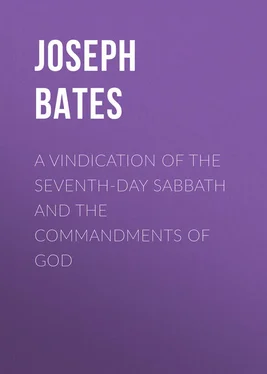Joseph Bates - A Vindication of the Seventh-Day Sabbath and the Commandments of God
Здесь есть возможность читать онлайн «Joseph Bates - A Vindication of the Seventh-Day Sabbath and the Commandments of God» — ознакомительный отрывок электронной книги совершенно бесплатно, а после прочтения отрывка купить полную версию. В некоторых случаях можно слушать аудио, скачать через торрент в формате fb2 и присутствует краткое содержание. ISBN: , Жанр: foreign_antique, foreign_prose, на английском языке. Описание произведения, (предисловие) а так же отзывы посетителей доступны на портале библиотеки ЛибКат.
- Название:A Vindication of the Seventh-Day Sabbath and the Commandments of God
- Автор:
- Жанр:
- Год:неизвестен
- ISBN:http://www.gutenberg.org/ebooks/30531
- Рейтинг книги:3 / 5. Голосов: 1
-
Избранное:Добавить в избранное
- Отзывы:
-
Ваша оценка:
- 60
- 1
- 2
- 3
- 4
- 5
A Vindication of the Seventh-Day Sabbath and the Commandments of God: краткое содержание, описание и аннотация
Предлагаем к чтению аннотацию, описание, краткое содержание или предисловие (зависит от того, что написал сам автор книги «A Vindication of the Seventh-Day Sabbath and the Commandments of God»). Если вы не нашли необходимую информацию о книге — напишите в комментариях, мы постараемся отыскать её.
A Vindication of the Seventh-Day Sabbath and the Commandments of God — читать онлайн ознакомительный отрывок
Ниже представлен текст книги, разбитый по страницам. Система сохранения места последней прочитанной страницы, позволяет с удобством читать онлайн бесплатно книгу «A Vindication of the Seventh-Day Sabbath and the Commandments of God», без необходимости каждый раз заново искать на чём Вы остановились. Поставьте закладку, и сможете в любой момент перейти на страницу, на которой закончили чтение.
Интервал:
Закладка:
Barnabas says, “if the covenant is not altered, amended nor repealed, then it means just what it says. ‘Thou shalt not do any work,’ stands out in bold relief against those who talk so much about the command, but never yet pretend to keep it. If they say they have a right to alter the phrase,” &c. Now we answer, that we never have attempted to alter it. It is perfectly right, and your bare assertion, in the absence of any kind of proof, does not, nor ever will prove, that we do not refrain from work on the Sabbath, according to the commandment, as set forth in the Scriptures.
Two kinds of work are specified or inferred in the law of Moses. “In the sweat of thy face shalt thou eat bread,” &c. The way this is done, “man goeth forth to his work and to his labor until evening.” This of course includes from the first day to the seventh. Then Sunday is the first working day of the six. This is distinguished servile work, because in Lev. xxiii. chap. and xxviii. and xxix. ch. of Numbers, the Lord's Sabbath and the Jewish Sabbaths of holy convocations are all brought to view, so that from the 14th day of the first month to the 22d, is the feast of unleavened bread with offerings, and fifty days from the wafe sheaf or resurrection is another. See Lev. xxiii: 16-18, and then from the first day of the 7th month until the 23d of the same, viz. 1st, 10th, 15th and 23d. The eight last days is a continual feast. Now the Sabbath of the Lord God must inevitably be included in this last eight day feast of Tabernacles; once every year, and very frequently on the first and tenth day Sabbaths, and so from the passover feast to the end of unleavened bread, always must include the weekly Sabbath every year; sometimes on a feast day, which John calls “an high day.” Now the order of these Jewish Sabbaths and feasts. God says of them “ every thing upon his day, besides the Sabbaths of the Lord,” &c. All the work was to be performed in these feasts, come on what day they did, besides the offerings on the Sabbath of the Lord. Lev. xxiii: 37, 38. Well, what was the work for every weekly Sabbath? See Num. xxviii: 9, and on Sabbath two lambs, besides the daily, which was two more; see 3d v. So we see here were always four lambs, with the meats, &c. offered every seventh day, and sometimes thirty bullocks, rams and lambs; and in all of the Jewish Sabbaths except that on the tenth of the seventh month, it is expressly said “ye shall do no servile work therein.” Now all this was work and labor, but it was ceremonial worship and obedience to God, hence it was not servile work. It is explained in Exo. xii: 16, “No manner of work shall be done save that which every soul must eat. That only may be done.” What will you do with all these commands, Barnabas. Did they not have to go out of their places after God gave them the law from mount Sinai? Did they not assemble for worship? Did they not prepare them food to eat, think ye, after the manna ceased? and did not the Saviour say of his disciples, when reproached for eating corn on the Sabbath day by the Pharisees, that they were guiltless? Was it wrong to take it without leave? See Deut. xxiii: 24, 22. Was not the work of circumcision always going on every weekly Sabbath? Now Jesus being the Lord of the Sabbath, shows us under the Gospel, where he transposes these ten commandments from the tables of stone, and gives them in our minds and writes them on our hearts; shows us that this work or labor on the Sabbath, were henceforth acts of necessity and mercy, instead of servile work because our mode of worshipping God was entirely changed. Hence Jesus said, “My Father worketh hitherto and I work.” John v: 17. See what kind of work, xvii: 4. “Done the will of God, finished his work,” after supper. See also iv: 34, and v: 36. See his good works, x: 25, 32. This then was the work that Jesus and his Father were doing, and for these he is called a notorious Sabbath breaker. Well he is now doing a marvellous work. Hab. i: 5, yet ye will not believe. “It is time for the Lord to work for men have made void thy law.” Psl. cxix.
It does not follow that men shall be put to death now for violating the Sabbath, any more than for violating the first, fifth, seventh, or all the commandments – for the penalty of death follows the violation of every one of the commandments.
1st commandment: “Thou shalt have no other Gods.” See Deut. xiii: 6-10 and Exo. xxii: 20.
2d. “Thou shalt not make any image.” Deut. xiii: 12, 16.
3d. “Thou shalt not profane my name.” Lev. xxiv: 16, 22, 23.
4th. “Remember the Sabbath day.” Num. xv: 32, 33, 36.
5th. “Honor thy father and thy mother.” Lev. xx: 9.
6th. “Thou shalt not kill.” Lev. xxiv: 21 and 17.
7th. “Thou shalt not commit adultery.” Lev. xx: 10.
8th. “Thou shalt not steal.” Joshua vii: 20, 21 and 25.
9th. “Thou shalt not witness falsely.” Deut. xix: 16, 17, 19, 21.
10th. “Thou shalt not covet.” Jos. vii: 20, 25.
All of the commandments together. Num. xv: 30, 31; see also Deut. xxviii: 15-67.
If these were all to be enforced now, there would be but a small remnant of the ten hundred millions now living, left upon the earth. If it is proper to enforce the fourth, it is the whole. How clear that all of these death penalties were annulled with the Jewish dispensation.
When Jesus begins to promulgate his Gospel, the stoning system is all broken up; see his admirable sermon on the mount. Matt v: 38-48. “Ye have heard that it hath been said an eye for an eye and a tooth for a tooth, but I say unto you that ye resist not evil, but whosoever shall smite thee on thy right cheek, turn to him the other also,” &c. &c. Here we see that all the followers of Jesus are to be peace men, or non-resistants, an entire change in administering the law. Says Barnabas, this is just what I have been trying to make you believe, that the law, all of the law that the Jews were subject to in their dispensation was abolished under the Gospel, for we are here under the new testament law, (grace). Not quite so fast: Jesus forseeing such kind of teaching as this, placed the commandments of God, (on which hung all the law and the prophets,) on an immovable and fixed foundation and carried the teaching and keeping of them clear into the reign of heaven; and any honest man who is seeking for the truth though he be ever so ignorant in other things, will admit, when he reads the 17-19, 21, 27 and 33d verses in this chapter, the force of this truth. What an idea that Jesus should promise such invaluable blessings to his followers after they become immortal only to mislead and tantalize them. This is the tendency of your no commandment no law system. Why Jesus tells you that the teachings of the bible have no other foundations to stand upon. Well the multitude would not believe him then as you and others will not now. See what confusion and shame they suffered and bore in withering silence from his simple direction about enforcing the old law for the violation of the seventh commandment. Here she is master, “Now Moses in the law, (not God's code of laws,) commanded that such should be stoned. But what sayest thou?” “Let him that is without sin, cast the first stone at her.” The consequence was that the woman was left without an accuser. Thus for once the whole multitude were convinced that the stoning system for violating the commandments was abolished. See John vii: 3-11. Again, you ask, “What type or part of the law was fulfilled by Christ keeping the seventh day, or in our keeping it?” Answer – “Love is the fulfilling of the law.” “If ye keep my commandments ye shall abide in my love, even as I keep my Father's commandments and abide in his love.” John xv: 10. “This is my commandment that ye love one another as I have loved you.” 12 verse. Again, Jesus says in Matt. xxii: 37-40, where he includes all of the commandments that love to God and love to our neighbor, is the whole law and the prophets, i. e. that this is the substance of the whole ten commandments. The great one on the first table, the second on the second table of stone. Paul tells the Hebrews that the law having a shadow of good things to come cannot make the comers thereunto perfect. This is the law of Moses. The ten commandments, the law which God audibly gave from his own mouth, is the one that Jesus here refers to, and the only one that he kept abiding in his Father's love. Isaiah says, “He will magnify the law and make it honorable.” You know he dishonored the law of Moses by abolishing sacrifices and offerings altogether, and nailing it to his cross. It appears to me that any child, anxious for the truth, would see this distinction. But no, you seem determined on abolishing the whole. You see that Jesus' commandment, John xiii: 34; xv: 12, is the very essence of his Father's and is given exclusively for the church; but his Father's was, and is for the whole human family, and the fourth contains the Sabbath. Now do you see what Jesus means when he says he came not to destroy the law but to fulfill, and don't you understand him to, that this law will stand after the heavens and the earth are passed away. Here then is how and where he fulfilled the law, or as you ask to know, a part of the law , for in keeping the commandments he certainly kept the Sabbath; see Mark vi: 2, and Luke iv: 16, 31. This, then, is the way we fulfill the law, by keeping the very same seventh-day Sabbath. There is but two codes of laws brought to view here, viz. God's and Moses'. Don't you see here he has fulfilled the first and abolished the last. You take this rule with you to your favorite texts, viz. Col. ii: 14-17; 2d Cor. iii, and Gal. ii. and v., where you say the commandments, the law of God, and the Sabbath, are abolished; and you will find the same distinction. God never gave Paul, nor you, nor any one else, any more liberty to preach that his law was abolished in this, or any other way, than he did to preach that there was no salvation for man. Don't you preach that man should obey the law of God, and when man obeys as Jesus did, don't he fulfill the law ? Can you tell how man can fulfill it without obeying the whole law? You say that will bring us into circumcision. How can that be, when he has, as I have just stated, abolished all the ceremonial part of the law of Abraham and Moses. Again, you say, the only reason given in the bible why the Sabbath was ever kept was, that the Israelites might remember that God brought them out of Egypt. Deut. v: 15. Your objection to the answer that was given by C. Stowe, and reiterating the question, as you have the above answered one, and challenging all who desire to be under the law to prove the contrary, in B. A. Dec. 2d, only goes for proof of your ignorance, or wilfull misunderstanding of God's commandment. If the fourth commandment in Exo. xx: 11, as she quoted and you dissent from it, is not the reason given why we should keep the Sabbath on the seventh day, as directed in the ninth and tenth verses, then it would be impossible to understand the simple word of the Lord. Because God has used the words “command thee ” to keep the Sabbath, in Deut. v: 15, every other word or form of speech where God requires the keeping of the Sabbath, is made void by you. What is the signification of commands? Is it not to appoint, enjoin, and require by authority? Does it not mean the same as to say “Remember the Sabbath day and keep it holy.” – “ Thou shalt not labor or do any work on the Sabbath day.” Exo. xx: 8-10. Once more, God says, “Ye shall keep the Sabbath.” Again, “Wherefore the children of Israel shall keep the Sabbath – for a perpetual covenant. For in six days the Lord made heaven and earth, and on the seventh day he rested and was refreshed.” xxxi: 14, 16, 17. You see the word command is also used in the 16th verse, for the fifth commandment, and because it is omitted in Exo. xx: 12, according to your rule it is not valid. But it is not so – God speaks as positively and understandingly when he says “ ye shall ,” as when he says “I command you.” Again, you say – “If Christ did not virtually annul the fourth commandment when he began his public ministry, then the Jews were right in killing him as a NOTORIOUS SABBATH BREAKER. He travelled about and did much work on the Sabbath.”
Читать дальшеИнтервал:
Закладка:
Похожие книги на «A Vindication of the Seventh-Day Sabbath and the Commandments of God»
Представляем Вашему вниманию похожие книги на «A Vindication of the Seventh-Day Sabbath and the Commandments of God» списком для выбора. Мы отобрали схожую по названию и смыслу литературу в надежде предоставить читателям больше вариантов отыскать новые, интересные, ещё непрочитанные произведения.
Обсуждение, отзывы о книге «A Vindication of the Seventh-Day Sabbath and the Commandments of God» и просто собственные мнения читателей. Оставьте ваши комментарии, напишите, что Вы думаете о произведении, его смысле или главных героях. Укажите что конкретно понравилось, а что нет, и почему Вы так считаете.












